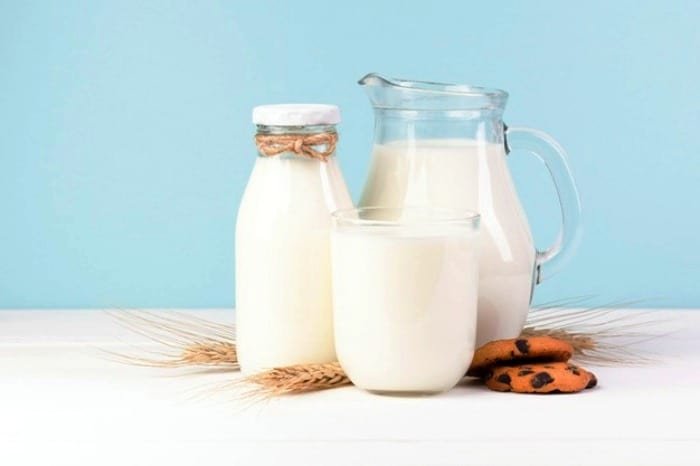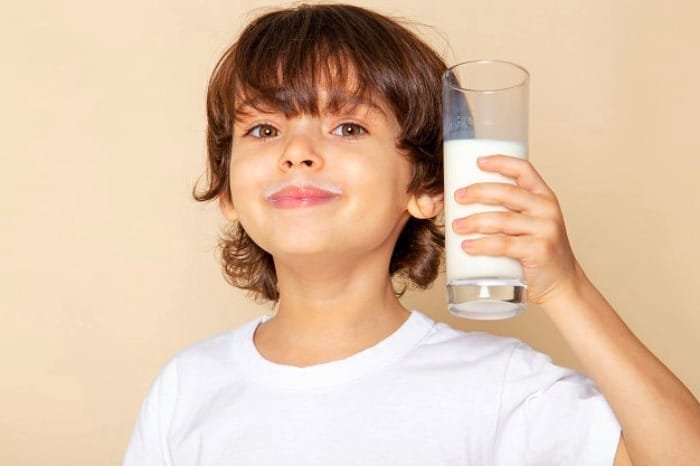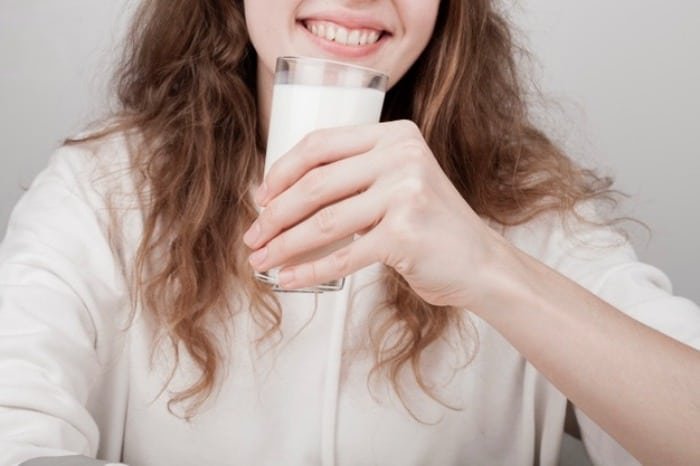Properties of MilkFor Body Health
Milk is the first food introduced to you after birth and serves as the only source of nutrition for infants for months after delivery. However, this unique reliance on milk as a vital nutritional source tends to lessen as the child grows and gradually becomes capable of digesting solid foods.
As the baby grows, milk gradually loses its place, so those who drink less milk will gain fewer health benefits from it. It should be noted that the benefits of milk are not limited to infants; they continue for individuals of all ages. In this section on health,we will introduce you to the incredible properties of milk for everyone of all ages.Nutritional Value of Milk
Calories: 146
- Protein: 8 grams
- Fat: 8 grams
- Calcium: 28%
- Vitamin D: 24%
- Riboflavin (B2): 26%Vitamin B12: 18%
- Potassium: 10%
- Phosphorus: 22%
- Selenium: 13%What is the nature of milk?
- Milk has three components. The first part is the watery component known as Ma’it, which is cold and moist in nature.
- The next component is the fat in milk, called Duhanit, which has a warm and dry nature.

The third component is what is used to make cheese, called Jubanit, which is cold and dry.
The nature of cow milk is moderate.
Industrial milk is cold because its fat has been removed, and it is not recommended for people with phlegm overpowering.
The nature of buffalo milk and camel milk is hot.Sheep milk is considered thick and has a moderate nature.Nature of goat milk and donkey milk is cold.
Benefits of Drinking Milk
1. Skin HealthMilk helps maintain smooth, soft, and glowing skin. This is due to the numerous vitamins and nutrients essential for skin health. We do not suggest filling a bathtub with milk to relax, but drinking at least two glasses of milk a day can provide this benefit.2. Strong Teeth
Milk is the best source of calcium, and that’s exactly what your teeth need. Additionally, milk helps prevent cavities and tooth decay. Calcium is only absorbed in the presence of vitamin D, so make sure the milk you drink is rich in vitamin D.3. Healthy BonesIt’s true that children should drink milk to enhance bone health for proper growth. Adults can also strengthen their bones with milk to prevent osteoporosis.
However, remember that vitamin D is needed for calcium absorption to ensure that the calcium in milk supports bone health.
4. Muscle GrowthDue to its protein content, milk is excellent for improving muscle growth. Many athletes drink milk after working out because this nutrient helps the body recover. Furthermore, milk helps prevent muscle soreness and replenishes fluids lost during physical activity.5. Weight LossStudies have shown that women who drink milk daily are more likely to lose weight compared to those who do not. If you are looking for a healthy snack, drink a glass of milk. It’s also recommended to have a glass of milk during dinner or while eating fruit.6. Reducing Stress

Thanks to the many vitamins and minerals in milk, it can act as a stress reliever. After a long, hard day at work, sit down and enjoy a glass of warm milk. This helps relieve muscle tension and relaxes the nerves.
7. Easing Premenstrual Symptoms
Many women suffer from premenstrual symptoms. It has been shown that milk calms the body and reduces negative effects on women during the menstrual cycle.
8. Energy Booster
Milk is great for many things, but did you know it is also excellent for boosting your energy? When you need to endure a tough day and need a little lift, drink a cold glass of milk. This will help you feel less fatigued.9. Relieving HeartburnSome foods are acidic and cause heartburn. One of the simplest and most interesting remedies to reduce this pain is to drink a glass of milk. The cooling effect and the thick consistency of milk help to coat the esophagus and stomach lining to ease heartburn.
10. Fighting Disease
In recent decades, researchers have found that milk helps prevent many different diseases. This includes its ability to reduce high blood pressure and lower the risk of stroke.Additionally, milk can reduce the liver’s cholesterol production and improves vision. Some researchers believe that milk may also lower the risk of certain types of cancer. Now that you know the benefits of drinking milk are more than you think, you may wonder if it matters what type of milk you drink? The short answer is no. You can choose low-fat, 2%, or whole milk. All have these benefits, just with different levels of fat and calories.11. Suitable for Diabetic PatientsBlood sugar levels can be controlled by drinking milk in the morning. People with type 2 diabetes can benefit from this. Consuming high-protein milk daily in the morning alongside high-carbohydrate cereals releases stomach hormones that slow digestion and induce feelings of fullness. This ensures that a person consumes less food, helping maintain blood sugar levels and reducing the risk of obesity.12. Lowering Allergy Risk
Raw milk, which is unpasteurized and unhomogenized, obtained from rural cows that eat food from the pasture, has often been criticized. However, this milk has more benefits than commonly thought. Research has shown that the likelihood of a person being hospitalized due to a bacterial illness caused by raw milk is three times less than the chance of dying in a plane crash. Milk contains nutrients like probiotics, vitamin D, and immunoglobulins that strengthen the immune system, which in turn reduces the risk of allergies.
13. Better Brain FunctionFor children, milk should be a primary source of nutrition because it is a good source of B vitamins, which help the brain function properly and keep sleep-wake cycles from being inactive. Specifically, cow milk is very beneficial for children because it has a lower ratio of lauric acid but a higher proportion of the enzyme LA/alpha-linolenic, ensuring the DHA levels in milk are what children need.14. Improving Heart Health

While we often correlate the calcium in milk with strengthening bones, it can also help reduce cardiovascular diseases and lower the risk of stroke. Milk also contains magnesium and potassium, which can help lower blood pressure and increase blood flow to vital organs, thus reducing pressure on the heart and cardiovascular system.15. A Great Source of Protein
Milk is a rich source of protein, and just one cup of milk contains 8 grams of protein. Protein is essential for many vital functions in your body, including growth and development, cell repair, and immune system regulation. Milk is considered a “complete protein,” meaning it contains all 9 essential amino acids needed for optimal body function.
There are two main proteins found in milk – casein and whey protein. Both are considered high-quality proteins. Casein makes up most of the protein in cow’s milk, accounting for 70-80% of total protein.Whey makes up about 20% of it.
16. DepressionSufficient vitamin D supports serotonin production, which is the hormone linked to mood, appetite, and sleep.17. Inflammatory Issues
Milk is often recommended as a remedy for everything from gout and arthritis to respiratory discomfort and skin burns. The combination of complete animal protein, omega-3 fatty acids, and antioxidant compounds in milk makes it an incredible anti-inflammatory substance. This unique combination of nutrients can relieve inflammation and improve nutrient digestion and absorption efficiency.
18. Enhancing Sleep Quality
Stress is one of the main reasons for sleep deprivation. Many people toss and turn in bed, and sleeping during stressful times can be very difficult. Other health conditions like menopause can also disrupt sleep patterns.
Milk contains the amino acid tryptophan, which can make you feel sleepy. Drinking a warm glass of milk before bedtime can help you sleep better. The body converts this amino acid into a neurotransmitter called serotonin, which makes you feel sleepy.

19. Maintaining Body HydrationAlong with water, milk is the best option for hydrating your body and keeping it energized throughout the day. Drinking milk after exercising helps quicken hydration and replenishes electrolytes lost during physical activity.
20. Improving Hair HealthMilk is rich in protein, calcium, and essential minerals needed for rapid hair growth. Milk works as an excellent moisturizer and conditioner, helping to restore dry and damaged hair.21. Reducing Cancer Risk
Numerous studies suggest that milk may also reduce cancer risk in both men and women. The high amounts of calcium, vitamin D, and conjugated linoleic acid (CLA) found in milk have anti-cancer properties. Milk also reduces the risk of cancers of the colon, breast, and rectum.
22. Skin Elasticity and Preventing Premature AgingThe effect of milk in protecting skin against the sun and keeping it moisturized can be attributed to its amino acids. Additionally, the vitamin A content of milk has antioxidant properties and acts as a free radical cleanser, helping to prevent premature skin aging due to oxidative stress. Furthermore, the lactic acid in milk acts as a natural exfoliant, helping to remove dead skin cells and other residues that can cause skin laxity and issues like acne.Properties of Milk for Pregnant WomenConsuming 2 glasses of milk daily (one glass in the morning and one glass in the evening) is essential and beneficial for pregnant women. The best milk for pregnant women is natural milk that does not have any chemical additives or preservatives. Fresh cow’s milk is preferred among them. Children whose mothers consumed milk during pregnancy tend to be taller and grow better. If you regularly consume milk during pregnancy, your child will not suffer from osteoporosis in adulthood. It also reduces the risk of rickets in newborns since milk is rich in vitamin D.Side Effects of Milk; Concerns and Precautions
Lactose IntoleranceLactose intolerance is a condition where a person lacks the enzyme lactase, necessary for properly digesting the sugar in milk.Some individuals produce insufficient lactase and cannot tolerate lactose beyond infancy.
Lactose intolerance can lead to abdominal bloating or diarrhea upon consuming milk and dairy products. The negative effects of lactose intolerance on the digestive system may jeopardize the absorption of nutrients from other foods.Milk allergy or milk sensitivity is different from lactose intolerance. This condition refers to an abnormal immune response in which the immune system produces an allergic antibody called IgE.Cow’s milk allergy can cause symptoms such as wheezing and asthma, diarrhea, vomiting, and gastrointestinal reactions. Other reactions include eczema, itchy swelling, and rhinitis or inflammation in the nose. In severe cases, it can lead to bleeding, pneumonia, and even anaphylaxis—a serious and potentially fatal allergic reaction.Excessive intake of potassium or phosphorus, both of which are found in high amounts in milk, can harm individuals whose kidneys are not fully functional. If the kidneys cannot eliminate excess potassium or phosphorus from the blood, it can be life-threatening.Excessive calcium intake alone from food is rare, but may cause unwanted side effects like constipation, kidney stones, or kidney failure. These side effects can occur when taking calcium supplements.
Excess calcium may also increase the risk of calcium deposits in arteries and raise the risk of heart disease, especially when magnesium intake is low.
A Substitute for MilkPlant-based milk is an appropriate alternative for those sensitive to lactose and for vegetarians.Acne

A 2016 study showed that teenagers with acne consume more low-fat or medium-fat milk. Dairy might also contribute to acne in adults.
What Kind of Milk Should We Drink?
Animals that have a gestation period closer to human gestation produce more suitable milk; therefore, cow milk and buffalo milk are appropriate for drinking as they have a moderate nature, recommended for people with sanguine and phlegmatic temperaments. Those with a hot temperament can sweeten their milk with sugar or sweeteners, while those with a cold temperament should better drink their milk with honey, ginger powder, or dates.What is the Best Time to Drink Milk?
Any time is good for drinking milk, especially before sleep. The best way to drink milk is warm because cold milk can cause stomach aches and bloating for those whose digestive systems are cold. To gain the best nutritional benefits from milk, avoid consuming an iron-rich meal at the same time, as it hinders iron absorption.Benefits of MilkProperties and Nutritional Value of MilkProperties of MilkWhat are the properties of drinking milk?Muscle GrowthProperties of Milk for Muscle Growth
Properties of Milk
Benefits of Consuming Milk for Energy Boost
Properties of Milk ConsumptionReducing Allergy Risk by Consuming MilkDepression
Combating DepressionImproving Hair Health
Properties of Milk for Hair

Preventing Premature Aging
Properties of Milk for SkinMilk for Pregnant WomenBenefits of Milk During PregnancyMilk for Weight LossAll Properties and Disadvantages of Milk
Properties of Milk
Vitamin D Deficiency
Sources of PotassiumProperties of MilkProperties of Cheese
Treatment of Phlegm Overbalance
Properties of Camel Milk
Properties of Goat Milk
Properties of Donkey Milk

Benefits of Milk
Treatment of Tooth Decay
Treatment of OsteoporosisIncreased Calcium Absorption
Familiarizing with NutrientsNutritional Value of MilkRapid Weight LossTreatment of StressHerbal Tea for Nerve Relaxation

Nature of Milk
Treatment of HeartburnCauses of HeartburnReducing High Blood PressureSymptoms of StrokeTreatment of Diabetes

Symptoms of Type 2 Diabetes
Normal Blood Sugar LevelsTreatment of Allergies
Properties of Drinking Milk
Heart Health Risk FactorsWays to Strengthen BonesProperties of MagnesiumTreatment of High Blood PressureProperties of Whey Protein
Treatment of DepressionMilk for DiabetesTreatment of Gout
Properties of Omega-3Relieving SleepinessMilk for Weight Loss
Preventing Premature Aging
Properties of Vitamin ATreatment of AcneSide Effects of MilkPregnancy Week by WeekTreatment of Rickets
Disadvantages of Milk

Treatment of Lactose Intolerance
Treatment of Abdominal Bloating
Treatment of Diarrhea
What is an Antibody
Treatment of Pneumonia
Useful FoodsTreatment of Kidney StonesTime to Consume MilkProperties of GingerProperties of Dates
Causes of Stomach Pain
Treatment of Bloating







